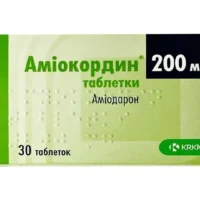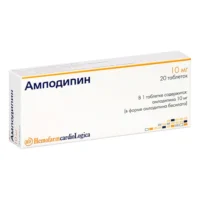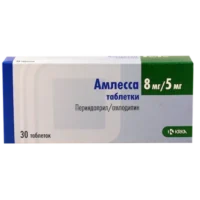Description
Irbetan-N Tablets 300 mg/12.5 mg. №30
Ingredients
- Each tablet contains:
- Irbesartan 300 mg
- Hydrochlorothiazide 12.5 mg
Mechanism of Action
Irbesartan-N tablets combine the angiotensin II receptor antagonist, irbesartan, with the thiazide diuretic, hydrochlorothiazide. Irbesartan blocks the vasoconstrictor and aldosterone-secreting effects of angiotensin II, leading to vasodilation and reduced blood pressure. Hydrochlorothiazide promotes diuresis and natriuresis, further aiding in blood pressure control through reduced blood volume.
Pharmacological Properties
The dual action of irbesartan and hydrochlorothiazide in Irbetan-N tablets results in potent antihypertensive effects by targeting different pathways involved in blood pressure regulation.
Indications for Use
Irbetan-N tablets are indicated for the treatment of hypertension in patients where combination therapy is deemed necessary for optimal blood pressure management.
Contraindications
Do not use Irbetan-N tablets if you are pregnant, have severe renal impairment, or have a known hypersensitivity to irbesartan, hydrochlorothiazide, or any other component of the formulation.
Side Effects
Common side effects may include dizziness, hypotension, electrolyte imbalances, and renal dysfunction. Monitoring of renal function and electrolytes is recommended during therapy.
Usage Instructions
The recommended dosage is one tablet daily, to be taken orally with a full glass of water. Administration with or without food does not affect the drug’s efficacy.
Benefits Compared to Analogues
Irbetan-N tablets offer the advantage of combining two potent antihypertensive agents in a single formulation, providing synergistic effects and potentially enhancing treatment outcomes compared to monotherapy with either component alone.
Suitable Patient Groups
Irbetan-N tablets can be used in adult patients requiring combination therapy for hypertension. Special caution and dose adjustment are necessary in elderly individuals and those with hepatic or renal impairment.
Storage and Shelf Life
Store Irbetan-N tablets in a cool, dry place away from direct sunlight. Keep the product in its original packaging to protect from moisture. Check the expiration date on the packaging and do not use the tablets beyond the stated shelf life.
Packaging Description
Irbetan-N tablets are supplied in blister packs containing 30 tablets. The packaging is designed to maintain the stability and integrity of the tablets until use.
Clinical Evidence and Proven Effectiveness
Studies have demonstrated the efficacy of irbesartan-hydrochlorothiazide combination therapy in lowering blood pressure levels in hypertensive patients. Clinical trials have shown superior efficacy of this combination compared to monotherapy with either component alone.
Additional Information
Regular monitoring of electrolyte levels and renal function is crucial during treatment with Irbetan-N tablets, particularly in patients with renal impairment. Consult a healthcare provider before initiating therapy, especially if you have a history of liver or kidney disease.





